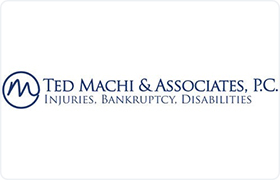Sachse Bankruptcy & Debt Lawyer, Texas
Sponsored Law Firm
-
 x
x

Click For More Info:
-
Machi & Associates, P.C.
1521 North Cooper Street Suite 550 Arlington, TX 76011» view mapAccident & Injury, Bankruptcy, Social Secuirty We Fight So You Don't Have To
Our professional team of attorneys and staff provide the experience and expertise needed to effectively handle your case.
800-804-0771
L. Stephen Rizzieri
Banking & Finance, International Other, Construction, Consumer Bankruptcy
Status: In Good Standing Licensed: 38 Years
Kristopher Scott Keith
Commercial Real Estate, Real Estate, Credit & Debt, Bankruptcy & Debt
Status: In Good Standing Licensed: 22 Years
Ugalahi Ugy Agbo Claire Offoboche
Workers' Compensation, Criminal, Credit & Debt, Personal Injury
Status: In Good Standing Licensed: 13 Years
Edward David Saldana
Construction, Mass Torts, Litigation, Commercial Bankruptcy
Status: In Good Standing Licensed: 25 Years
Jason Andrew Leboeuf
Bankruptcy, Criminal, Commercial Real Estate, Business, Consumer Bankruptcy
Status: In Good Standing Licensed: 23 Years
Randolph Norman Wisener
Pension & Benefits, Child Support, Business & Trade, Bankruptcy & Debt
Status: Inactive Licensed: 37 Years
Robert H. Nunnally
Intellectual Property, Health Care, Insurance, Business, Consumer Bankruptcy
Status: In Good Standing Licensed: 40 Years
L. L. McBee
Insurance, Credit & Debt, Personal Injury, Elder Law
Status: In Good Standing Licensed: 45 Years
Janet F. Resetar
Bankruptcy, Family Law, Clean Air Practice, Wills
Status: Deceased Licensed: 28 Years
 Ted Machi Arlington, TX
Ted Machi Arlington, TX Practice AreasExpertise
Practice AreasExpertise
